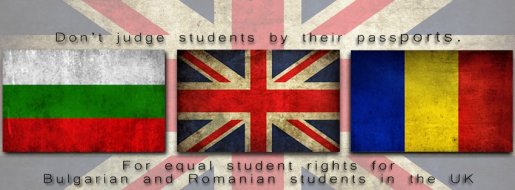Bulgarian and Romanian Students Fighting for their Dreams


Yuliya is a Bulgarian first year Journalism student at UWE in Bristol. Here she argues that Romanian and Bulgarian students should be given the same rights as students from other EU countries.
"Despite being part of the last enlargement of the EU in 2007, Bulgarians and Romanians are still facing work restrictions in the UK. Although they will be lifted in 2014, many students face the risk of not finishing their studies. Not only are the living costs a problem, but so are the paid placements that are part of many undergraduate and postgraduate courses around the country.
Imagine you are a student coming from Bulgaria or Romania. You are passionate about the course you have chosen and you are impatient to settle down in the UK. You are ready to study hard and to work part-time in between the lectures, because you are coming from one of the poorest countries in the EU with an average salary of under £300 a month.
In the middle of September you say good-bye to your friends and family; you arrange your new accommodation; start meeting new people... everything seems perfect except the money issue. You know that you have to apply for the so called "yellow card" - the work permit you need as a Bulgarian or Romanian.
Necessity of a Yellow Card
You like the country, so it doesn't matter how many documents you need to provide. Some even say you need a Comprehensive Sickness Insurance (worth up to £500), despite already having a European Health Card. You do it because you have to work. Even if you are coming from a richer family and they can support you financially, you still need the yellow card, as many courses include a paid placement.
Now you are about to prove to the world that patience should be a good life strategy and you start waiting. According to the UK Border Agency, 99% of the cases should be decided within 6 months of receipt. The reality, however, is that in the last few years the average waiting period was 10 months. In fact, up until the 2nd January 2013, the website showed that the UKBA was currently working on cases received in February 2012. This has now changed to July 2012.
What's more, since the beginning of the year, the ‘urgent requests procedure', through which employers could contact the Border Agency in order to speed up the procedure, is no longer available.
Unfair and Illegal
If we leave aside the personal perspective that we have adopted and look at the legal side of the problem, we will find out that the current situation is not only hilarious, but also seems illegal. The students qualify as individuals who should receive their registration certificates immediately, at least according to the British and European law. The UKBA interprets this as up to 20 days.
Added to all this is the fact that according to EU legislation, the citizens of a member state cannot be treated unfavorably compared to the citizens of a third country. This is indeed the case, as all other students receive the right to work up to 20 hours per week during term time prior to their arrival in the UK. In the case of all other EU nationals, they receive automatic access to the labor market based on their treaty right. As for all third country nationals, their Tier 4 Visa serves as their work permit.
Therefore, it is easy to understand why Bulgarian and Romanian students have initiated a campaign and Facebook group with more than 3,700 members. They are not only Bulgarians and Romanians but people from around the world that care about the students' rights. Letters to MPs, MSPs and MEPs have been sent, asking for their support. There is a petition which everyone with a UK address can sign here. An open letter was sent to the Bulgarian authorities and letters to the Romanian and British politicians will follow.
If the Bulgarian and Romanian students manage to solve the problem now, it will not only be to their benefit, but also to that of Croatian students that will face the same bureaucracy problems once the country joins the EU. Furthermore, this is a good reason for all international students in the UK to show they can stick together and to prove to the world that young people can change political injustice and should follow their dreams regardless of the obstacles in their way."
Are you a Romanian or Bulgarian stuent who wants to tell their own story? Get in contact with us here or in the comments box below.








